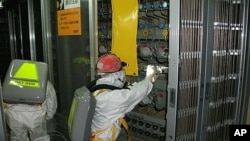The operator of a severely damaged nuclear power plant in northeastern Japan says new evidence shows that a partial nuclear fuel meltdown occurred within hours of a massive earthquake and tsunami that devastated the region two months ago.
The Tokyo Electric Power Company, which manages the crippled Fukushima-Daiichi plant, says fuel in reactor number 1 was in a critical state just 16 hours after disaster struck March 11. A TEPCO spokesman said most of the reactor's fuel rods had melted and fallen to the bottom of the reactor's pressure vessel - a cylindrical steel container that holds nuclear fuel - by March 12.
Despite the discovery, which is based on new data collected last week, authorities say they plan to stick to a timetable for stabilizing the plant and bringing all six of its reactors to a state of "cold shutdown" by January.
Meanwhile, Japanese authorities on Sunday began evacuating thousands of residents from two villages outside a government safety zone set up to protect locals from high levels of radiation leaking from the crippled power plant.
Residents in the communities outside the 20-kilometer safety radius from the Fukushima plant began phased relocations to a designated safe area because of health risks from wind-borne radiation seeping from the plant. Television footage showed the first batch of evacuees consisted mainly of families with small children and pregnant women, who are considered most vulnerable to long-term radiation effects.
Japan: Partial Fuel Meltdown Occurred Within Hours of Disaster




